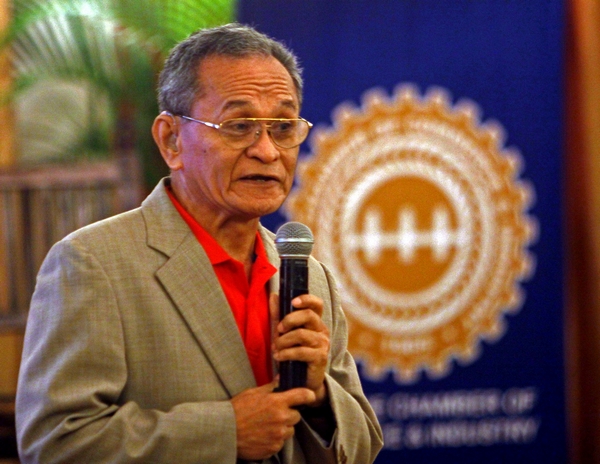
FAJARDO
It’s not a good idea – economist
A Cebu-based economist has warned the government about the risk of allowing a government agency to meddle in the business of importing fuel as a solution to mitigate the impact of the country’s high inflation rate.
It will be prone to corruption, according to Cebuano economist and Cebu Daily News columnist Fernando “Perry” Fajardo.
“Government in business is inefficient. Magdaghan lang ang korapsyon. Tanawa ang NFA nga ga-control sa rice importation (There will be corruption. Just look at the National Food Authority which is controlling the importation of rice),” said Fajardo, who is also the executive director of the Cebu Business Club.
Fajardo was reacting to a plan by the Department of Energy (DOE) to tap the Philippine National Oil Company – Exploration Corporation (PNOC-EC) to import low-priced fuel in to the country as their way of mitigating the impact of continued increase of prices of basic commodities in the country.
Energy Secretary Alfonso Cusi earlier said in a statement that through their plan, the PNOC-EC will be sourcing low-priced petroleum products, particularly diesel, to arrest the impact of volatile oil prices.
Price increase of oil and fuel in the world market has been considered as one of the reasons for the continued increase of inflation rates in the country in recent months.
DOE plan
According to the DOE, the PNOC-EC has acquired last December 2017 a trading function to generate added income for the government.
The department believes that this plan will have a ripple effect in taming the prices of basic commodities and thereby controlling inflation.
This price relief would ease the plight of consumers that are gravely affected by this trend, they added.
Under the project, the trading function of PNOC-EC will be employed in the acquisition of low-priced fuel which will mainly come from state deals.
Based on its website, the PNOC-EC is the “upstream oil, gas, and coal subsidiary of the state-owned Philippine National Oil Company which is a government-owned and controlled corporation.
However, Fajardo said he does not see anything good with a government instrumentality being involved in the importation of low-priced fuel.
“If that (low-priced oil) is available, why is it not presently imported by the private sector? Aren’t they also importing oil?” Fajardo said in Cebuano.
The PNOC-EC Board, which is chaired by the energy secretary, is currently drafting the trading procedure and policy safeguards for the public on the proposed importation of low-priced fuel.
The DOE said that the products brought at a special price will be made available to dealers, operators, and independent petroleum players under a Memorandum of Agreement (MOA).
There is still no definite timeline as to when this will be started or implemented.
In July, inflation accelerated to 5.7 percent – a fresh over five-year high.
With this rate, headline inflation or the rate of increase in prices of basic goods and services averaged 4.5 percent during the first seven months of 2018. This is above the government’s target range of 2.4 percent for this year.
Finance Undersecretary Karl Chua earlier explained that the main drivers of increase in inflation are international adjustment in oil prices and even the scarcity of fish.
Euro 2 standard
Meanwhile, the DOE has also issued a directive to allow the importation of the 22-year old Euro 2 standard for diesel.
Doing this, would allow oil companies to offer a cheaper alternative for motorists to help them cope with the rising prices of basic commodities.
“Pursuant to existing Philippine National Standards on Diesel Fuel Quality and in accordance with the provisions of Republic Act 8479, otherwise known as the Downstream Oil Deregulation Law, Republic Act 8749, otherwise known as the Philippine Clean Air Act and for the purpose of reducing the impact of rising petroleum prices in the world market, all industry players are hereby directed to provide at the retail level Euro-II compliant automotive diesel oil as a fuel option for the transport and industrial customers,” read the DOE’s memorandum order (MO).
The same MO also directs oil companies offering Euro 2 compliant diesel to submit a monthly compliance report, indicating the list of participating retail outlets.
Cusi also assured that the sale of this type of diesel will be closely monitored by the DOE.
In a press conference in Manila yesterday, DOE Spokesperson Undersecretary Felix William Fuentebella said that the department’s decision does not violate any environmental or health standard.
Based on DOE’s estimates, Euro 2 diesel, which contains higher sulfur, costs P0.28 to P0.30 less than Euro 4 diesel.
“The goal is to address the need of the people to have an option for cheaper diesel, and it can also address our economy’s concern as this means lower prices per liter of diesel” said Fuentebella in Filipino during the press conference which was broadcast on the DOE’s Facebook page live.
With sulfur content at 500 parts per million (PPM), Euro 2 fuel is considered 10 times more polluting compared to Euro 4 which has sulfur content of just 50 PPM.
The Philippines has shifted to a Euro 4 standard two years ago but most carmakers have yet to completely make the switch.